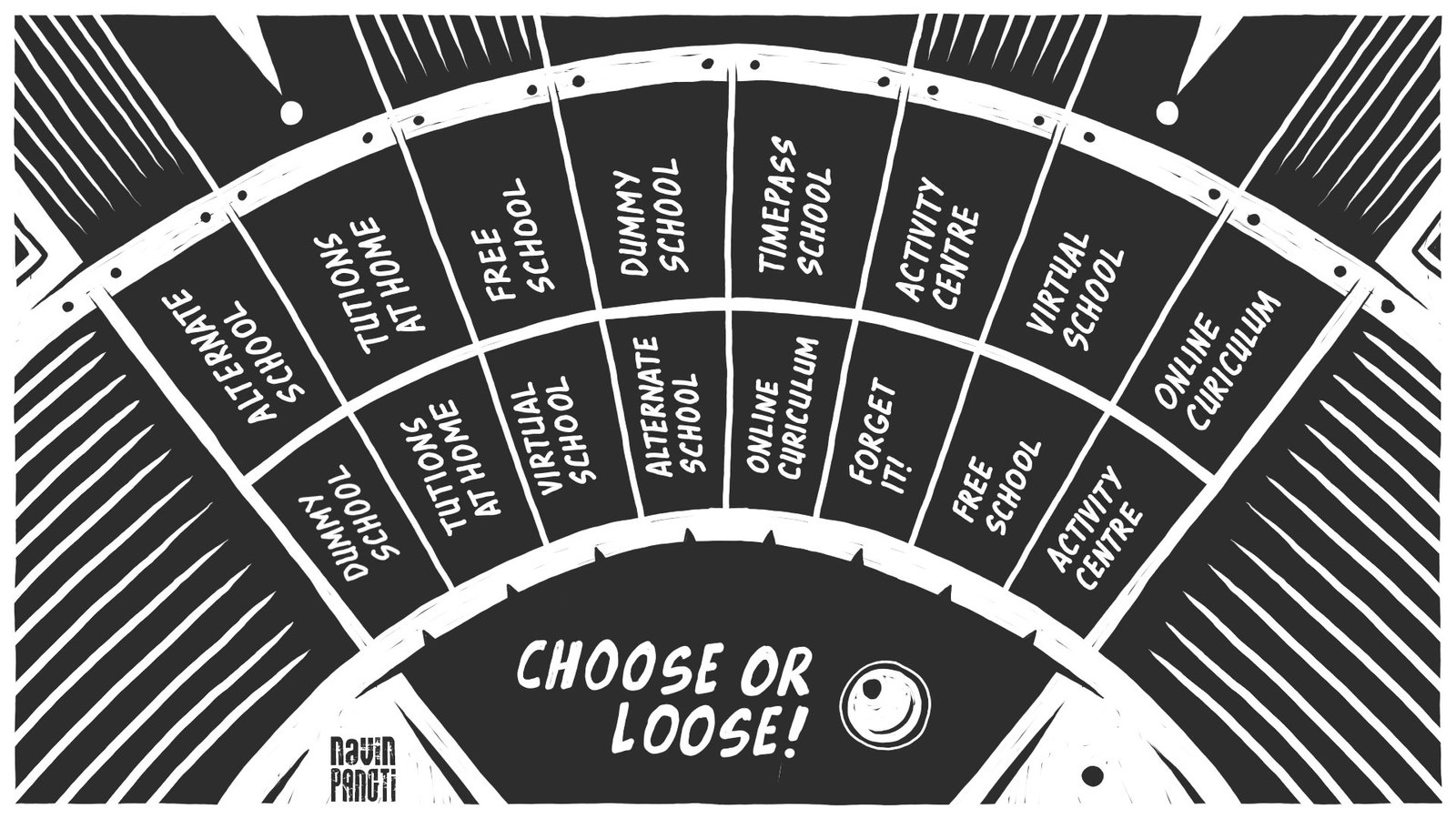Homeschooling with an unwilling spouse
The choice to homeschool your child is not an easy one. Forget the perception of society, even the near and dear ones find it hard to acknowledge this rather ‘unconventional’ choice. But nothing can be worse than an unwilling spouse.

Homeschooling is not an individual choice. A buy-in from both the parents is almost mandatory. In this article we will not be discussing the single parent scenario, complexities of which are entirely different. We are also not getting into the dynamics of a joint family system. And in case of an extended family living together, we are assuming that the mother and father of the child are the primary decision makers whose consent and commitment is the key driver of the homeschooling journey.
Homeschooling in India is not an easy choice. There are too many questions and concerns from near and dear ones. And then we have parents and in-laws who may almost be willing to wage a war for ‘securing’ the future of their grandchildren. Their concerns may be misplaced but their intentions are not. After all, as parents, they feel duty bound to cover your flanks. But we are not discussing that as well. Let us focus solely on the issue of willingness from the spouse when one partner champions the cause of homeschooling.
In one of my first interactions with homeschoolers, a senior homeschooler took the stage to answer queries from the newbies. An enthusiastic mother shared her anguish about her husband who was not giving in. She, on the other hand, was totally convinced that school is not the place where she wanted her child to be. To my surprise, the senior homeschooler fueled her anguish with the logic – How can you husband refuse? The child is yours too! She went on to suggest that the mother was within her rights to unilaterally do what she felt was right as she was the one spending time with the child. The tone and tenor was almost like a call for war. I found it disturbing. I felt as if she was almost suggesting that matrimony can be sacrificed on the altar of homeschooling.
Over the years I have come across numerous families where one of the partners is unwilling to accept homeschooling as a choice. Most of the time it is the father who is unwilling. Many a time’s mothers have asked me to talk to their husbands to convince them about this option. My answer, almost as a rule, has been pretty straightforward – Convincing your partner is your responsibility. It cannot be outsourced, especially when the decision is critical and commitment long term.
One may be willing to answer the queries of the spouse but not argue on behalf of one of the partners. After all, homeschooling is not a cult and senior homeschoolers are not the cult leaders. If you find someone wanting to engage in such a conversation on your behalf, my advice would be – maintain distance!
The best option to resolve such an issue is to gather information, process it and build a solid case that clearly articulates your vision. Just rubbishing schooling does not help. Almost everyone knows that schooling is hogwash. What people do not know is how the alternate journeys address the deficiencies of the schooling system.
To make a winning case, one needs to fully understand the perspectives of the spouse. While doing so one needs to realise that the reservations of the spouse grow out of legitimate concerns for the child. You may find the concerns immature or may feel that your spouse has not given enough thought to the idea of homeschooling. You have the right to hold such opinions. But simultaneously, you would also be pretty sure about the fact that your spouse would not want to willingly create an unhappy learning environment for your child. If that is not true then I suggest you should run to a marriage counsellor instead of reading this article further.
The best way to convince your spouse is to address his or her concerns, point by point. To assist you in this endeavour, you could motivate your spouse to meetup with other homeschoolers, not to argue but understand their respective journeys. It is a good idea to attend local meetups, if any. In case you end up taking your spouse to meet some senior homeschooler who starts singing aloud how your spouse is unable to perceive the ‘obvious’ reality, you can very well say goodbye to the possibility of consent. To avoid such a scenario it is always better to vet the person prior to getting him or her to meet your unwilling spouse.
One needs to put in all these efforts because this rather long journey can be very tiresome at times and if your spouse is not willing to shoulder some part of the burden, or at least provide you his/her shoulder when you are exhausted, you may end up questioning your own decision.
Homeschooling could be a very emotional issue for you but is it worth a marital discord is a question that only you can answer. I feel Homeschooling is a wonderful choice but not a universal solution. So, in the absence of unanimity, it is better to take it slow and wait for consensus to emerge.
In a scenario where the spouse is unwilling to buy-in even after you have placed all your cards on the table and made forceful arguments, I think it is better to start exploring middle grounds rather than searching for a gun. There are many middle grounds that one can explore.

To make valid choices, one needs to understand the entire scope of a homeschooling journey rather than latching on to some ‘ism’ in the name of homeschooling. I have covered various types of homeschooling journeys in the article – A homeschooling Primer. But even that list is not comprehensive. The whole idea of homeschooling is to custom build an approach that suits the unique needs of the child and works well with the parents. Presented below are some middle ground options which one could explore –
Middle ground 1 – Don’t send the child to school but earmark time for age-specific studies. The study can be facilitated by one or both the parents, or done with the help of a tutor. Tutor could an older sibling, a professional tutor or an online service. This will ‘minimize’ the ‘risks’ and enable an easy transition to a schooling environment in case homeschooling does not work out.
Middle ground 2 – As an extension to option 1, you could send your child to a learning/activity centre. While the child will ‘learn’ school subjects through tuition, he/she can ‘socialize’ and ‘experience’ learning at such centres. Such centres are not very common in India but the bigger cities do offer some options.
Middle ground 3 – Internationally, there are some organisations that offer homeschooling curriculum. The curriculums are based on some specific pedagogy or education board. This method ensures steady learning path and periodic assessments. One could also tailor-make this approach with the help of various online education services. Apart from these, there also exist many virtual schools. Searching online for virtual schools will throw up multiple possibilities. Join homeschooling e-groups to find parents who can share their firsthand experience about these opportunities.
Middle ground 4 – Send the child to an alternate school. The school could be a free learning school or an alternate experiential learning based school where ‘testing’ the child is not the sole motive of education. There is a good chance that an anti-homeschooling spouse may be willing to explore this option as a middle ground.
Middle ground 5 – If the spouse suspects the motives of the alternate schools as well then you can lay down the guns to negotiate sending the child to a conventional ‘low academic pressure’ school rather than highly competitive schools often quoted as ‘the-best’.
Middle ground 6 – This option is rather unconventional and slightly illegal. It is an approach followed by many coaching institutes in India. The child is admitted to a ‘dummy’ school which a child seldom, or never, attends. The attendance is marked and the child is allowed to sit for tests and exams. This route is also followed by students who dedicate most of their time to competitive sports or other demanding vocations or interests.
If none of the above works then you are in a complex situation. It is best to delay the decision and get back to it when an appropriate time comes. You have the option of making your displeasure evident but it is not advisable to sulk over the issue because that does not help the cause in any way. It is better that you focus your energies on stealing moments of ‘learning’ that can help your child develop her/his curiosity and willingness to learn. Meanwhile you can keep researching and sharing the learning with your spouse, thereby keeping the ‘possibility’ alive.
The bottom line is that homeschooling is cool but not the be all and end all of learning. And if one embarks on this journey then to ensure a cordial and fruitful homeschooling environment it is a must that both the partners are on the same page, almost!















Thank you for discussing this topic. Felt very related. I am waiting, as you suggested in the last of the article, my husband to understand that me and my daughter are grown together in such a way we can not trace the conventional route of the education/earning living system.
I have known Navin for over a decade and admire his quiet yet wise and courageous decisions, which have led him away from the urban jungle to a remote place in the Himalayas. He is one of the founding members of Swashikshan. This article is well written and will definitely prove to be of great help to families striving to do their best for their children. Whether you call it homeschooling, or home education or life long learning, I believe that we all are on a journey where we learn from each and every person and occasion, if our hearts are truly open and humble. God bless you Navin.
thanks for your kind words dr mathew